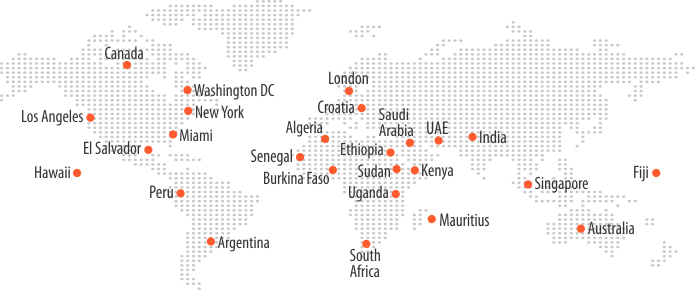Unlocking the New Era of Global Reach: The Pivotal Role of Wholesale VoIP Termination

VoIP termination services have been the catalyst in eradicating geographical barriers and streamlining carrier interconnections, dramatically reducing costs and installation time frames. The backbone of this transformation lies in the adeptness of wholesale VoIP termination providers and other industry players who deftly navigate the complexities of call routing.
Having said that, what is origination and termination in VoIP?
Origination is when a user places the call, and their voice is converted into digital packets before being sent over the network.
Termination in VoIP refers to routing incoming calls from one network to another until they reach their intended destination, where the digital data is converted back into analog voice signals.
The international wholesale voice carrier market exceeded $30 billion in 2022 and is expected to grow at a striking 15% CAGR from 2023 to 2032, surging to $120 billion by 2032. As businesses encounter international call volume surges that necessitate scalable calling capabilities, A-Z VoIP termination services are emerging as the preferred alternatives, enabling seamless global communication with enhanced efficiency and accessibility.
Let’s explore how some noteworthy aspects of wholesale VoIP termination enable uninterrupted global connectivity despite fraud traffic, the influx of new players, and economic pressures.
7 Key Aspects of Wholesale VoIP Termination Facilitating Uninterrupted Global Connectivity
The Role of Wholesale VoIP Providers
Wholesale VoIP termination providers leverage Session Initiation Protocol (SIP) and Real-time Transport Protocol (RTP) to ensure efficient call origination, processing, and termination. By employing sophisticated call routing algorithms, they optimize traffic management, considering factors like cost, quality, available capacity, and time of day.
Termination providers use an automated carrier platform, where carriers can seamlessly exchange routes and termination services globally. Moreover, digital transformation in the telecom industry has empowered providers with AI-driven routing optimization, cloud-based virtualization, and real-time analytics to offer carriers a wide array of price-quality choices.
Efficient Call Processing, Routing, and Termination for Global Traffic
A-Z VoIP termination services masterfully handle call origination and processing to ensure smooth initiation and transmission of voice data across networks.
How do you handle a termination call?
Agile routing strategies, such as Least Cost Routing (LCR) and Quality-based Routing (QBR) ensure efficient global traffic management for optimal call routing.
High-quality termination is ensured through robust interconnections with a diverse network of carriers, allowing for redundancy and failover mechanisms.
Real-time Quality of Service (QoS) monitoring enables prompt identification and resolution of latency, jitter, or packet loss issues for crystal-clear voice transmission during international calls.
Advanced Services and Features
Apart from LCR and QBR, wholesale VoIP termination providers deploy geographical routing that utilizes comprehensive global databases to route calls based on geographical proximity, reducing call latency for international calls. Advanced mechanisms like, load balancing algorithms, automatic route selection, and geographically redundant points of presence facilitate intelligent call distribution based on current load, capacity, quality, and backup routes. Advanced analytics platforms analyze traffic patterns and usage trends, helping providers identify peak hours, busiest destinations, and potential congestion points. This information enables effective capacity planning and resource allocation.
Pricing Models: Factors Influencing Wholesale Termination Costs
Various factors come into play that affect costs for A-Z VoIP termination services. Carrier interconnections, call volumes, destination routes, and service quality levels are some of the key determinants. Innovative pricing models have emerged as carriers seek cost-effective solutions without compromising call quality.
Volume-based pricing offers reduced per-minute rates for carriers handling higher call volumes, motivating them to manage substantial traffic efficiently. Tiered pricing involves different price tiers for call destinations, while dynamic pricing adjusts rates in real time based on network conditions and demand.
Technical Infrastructure
Besides SIP and RTP, wholesale VoIP termination providers deploy robust encryption mechanisms like Transport Layer Security (TLS) and Secure Real-time Transport Protocol (SRTP) to shield calls from unauthorized access and ensure data confidentiality. Virtualization solutions are central to the technical infrastructure that help providers expand network capacity to meet growing demands without costly hardware investments. For instance, virtual Session Border Controllers (SBCs) manage firewalls, encryption, and network resource optimization, all while minimizing hardware footprint and operational complexity.
Superior Quality of Service (QoS) for Global Communication
Several factors influence call quality, including network congestion, codec selection, and the choice of carrier routes. Advanced monitoring tools analyze call performance metrics, enabling providers to identify and resolve issues swiftly and proactively. Jitter, latency, and packet loss are common culprits impacting the quality of A-Z VoIP termination services. Providers combat these challenges by deploying low-latency networks, prioritization mechanisms, and codecs optimized for reducing jitter and packet loss.
Safeguarding Global Calls: Security Measures in Wholesale VoIP
Preventing SIP and VoIP fraud requires a multi-layered approach, including real-time monitoring of call patterns, suspicious traffic detection, and blacklisting of fraudulent sources. Wholesale VoIP termination providers implement robust firewalls and SBCs, acting as gatekeepers to regulate incoming and outgoing call traffic. These security gateways enforce access policies, protect against Denial of Service (DoS) attacks, and manage call signaling and media streams, ensuring only authorized communications traverse the network.
TLS encrypts call signaling data, ensuring secure transmission between endpoints and preventing tampering or interception of sensitive call information. SRTP, on the other hand, encrypts the voice media, guaranteeing that call content remains confidential and secure during transmission.
Wholesale VoIP Termination: The Passport to Seamless International Communication
Wholesale VoIP termination providers are central in facilitating seamless global communication, providing secure, reliable, cost-efficient, and scalable solutions for carriers and service providers worldwide. Agile routing algorithms optimize traffic management, while advanced analytics provide valuable insights for capacity planning. With flexible pricing models, businesses can achieve cost-efficient solutions without compromising call quality. The robust technical infrastructure ensures data privacy with encryption mechanisms and virtualization. With its myriad benefits and innovative features, A-Z VoIP termination services stand at the forefront of transforming global communication and bridging continents. Wholesale VoIP empowers businesses to thrive in an interconnected world.
Bankai Group empowers telecom operators and carriers with A-Z voice termination services that bridge the gap between customer expectations and exceptional wholesale carrier solutions. Discover more about our unparalleled global coverage and elevate your communication network today.






